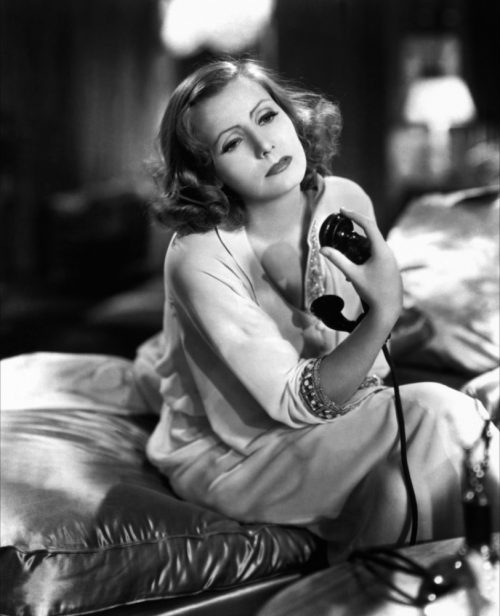
A Review by Lucia Adams
Grand Hotel, the finest movie of the Depression era and 1932 Oscar winner for Best Picture, a cosmopolitan feast of Mittel Europa in the final year of Weimar Berlin, still sparkles, however mournfully. The masterwork of Thalberg’s MGM, with its economy-defying all-star cast and customary refined elegance, is set in an opulent Art Deco hotel, where wealthy guests glide to Tales of the Vienna Woods. Beneath the top hats, white ties, backless satin gowns, champagne and baccarat, however, fear and despair lurk. In this melancholy dirge to pre-war Europe the Great War is still alive in scarred faces and wounded souls, the rich and less rich united by dire finances, their lives hanging by a thread.

Greta Garbo and John Barrymore.
A ballerina, a baron (there’s usually a baron or two in entre deux guerre films), an accountant, a stenographer, and a tycoon in little more than one day, and in one place, Racinian verities reflecting the successful stage play preceding it, experience life changing events. Baron Felix von Geigern, John Barrymore in perpetual profile, an impoverished nobleman now forcement a jewel thief targets the precious pearls of Grusinskaya, Garbo’s depressed Russian ballerina, vanting vanting to be alone, loudly lamenting the dying of the imperial white peacock. When she discovers him in the act instead of calling the police she falls madly in love in a long cameo in big close up, two gigantic stars verbally making love with very racy pre-code dialogue, Barrymore profoundly poignant, Garbo ornate, a golden hair over the tipping point of self-parody.

Joan Crawford and Wallace Beery.
In a parallel story evil industrialist General Director Preysing, Wallace Beery, curiously with the only German accent in the film, is on the verge of bankruptcy. The hypocritical adulterer is travelling with his promiscuous money-motivated secretary, Flaemmchen, Joan Crawford all Comedia dell’ Arte white mask and rolling eyes. She prefers the baron (“I don’t suppose you’d, uh, take some dictation from me sometime, would you?”) and ends up with Otto Kringelein, Lionel Barrymore’s dying accountant succumbing to hysteria but the moral heart of the film. When he wins royally at the tables, he carpes the diem, declaring “To life! To the magnificent, dangerous, brief, brief, wonderful life…and the courage to live it!”
Lionel Barrymore and Joan Crawford.
When von Geigern is caught pilfering in Preysing’s room the vulgar boor bludgeons the aristocrat to death with a telephone, the film’s main prop device from the first switchboard scene, symbolizing the new world of technology and the end of gentility, as Grusinskaya flamboyantly departs for the train station to meet her new lover. In the penultimate scene Senf the porter receives a phone call announcing the birth of a son, the working class wage earner inheriting the earth, though British director Edmund Goulding chooses neither side of the capitalist-socialist fence. The cynical, scarred narrator Dr. Otternschlag gets the last word about the Grand Hotel, “A hundred doors leading to one hall. No one knows anything about the person next to them. And when you leave, someone occupies your room, lies in your bed… that’s the end.” The end indeed. Presciently the next year another great war was on its way when the Third Reich was declared.

Grand Hotel debuted in New York the year my father arrived from West Texas, in pencil moustache and foulard, to pursue a fantasy of a sophisticated, bohemian life just like Hollywood depicted. The Depression forestalled his fantasy but he never lost his dream, which he conveyed to me vividly and unforgettably.








